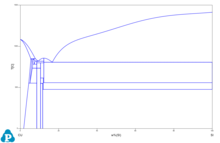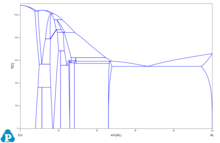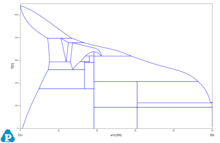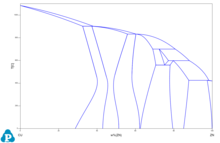
Copper alloys are metal alloys that have copper as their principal component. They have high resistance against corrosion. Of the large number of different types, the best known traditional types are bronze, where tin is a significant addition, and brass, using zinc instead. Both of these are imprecise terms. Latten is a further term, mostly used for coins with a very high copper content. Today the term copper alloy tends to be substituted for all of these, especially by museums.
Copper deposits are abundant in most parts of the world (globally 70 parts per million), and it has therefore always been a relatively cheap metal. By contrast, tin is relatively rare (2 parts per million), and in Europe and the Mediterranean region, and even in prehistoric times had to be traded considerable distances, and was expensive, sometimes virtually unobtainable. Zinc is even more common at 75 parts per million, but is harder to extract from its ores. Bronze with the ideal percentage of tin was therefore expensive and the proportion of tin was often reduced to save cost. The discovery and exploitation of the Bolivian tin belt in the 19th century made tin far cheaper, although forecasts for future supplies are less positive.
There are as many as 400 different copper and copper alloy compositions loosely grouped into the categories: copper, high copper alloy, brasses, bronzes, cupronickel, copper–nickel–zinc (nickel silver), leaded copper, and special alloys.
Composition
The similarity in external appearance of the various alloys, along with the different combinations of elements used when making each alloy, can lead to confusion when categorizing the different compositions. The following table lists the principal alloying element for four of the more common types used in modern industry, along with the name for each type. Historical types, such as those that characterize the Bronze Age, are vaguer as the mixtures were generally variable.
| Family | Principal alloying element | UNS numbers |
|---|---|---|
| Copper alloys, brass | Zinc (Zn) | C1xxxx–C4xxxx,C66400–C69800 |
| Phosphor bronze | Tin (Sn) | C5xxxx |
| Aluminium bronzes | Aluminium (Al) | C60600–C64200 |
| Silicon bronzes | Silicon (Si) | C64700–C66100 |
| Cupronickel, nickel silvers | Nickel (Ni) | C7xxxx |
| Name | Nominal composition (percentages) | Form and condition | Yield strength (0.2% offset, ksi) | Tensile strength (ksi) | Elongation in 2 inches (percent) | Hardness (Brinell scale) | Comments |
|---|---|---|---|---|---|---|---|
| Copper (ASTM B1, B2, B3, B152, B124, R133) | Cu 99.9 | Annealed | 10 | 32 | 45 | 42 | Electrical equipment, roofing, screens |
| Cold-drawn | 40 | 45 | 15 | 90 | |||
| Cold-rolled | 40 | 46 | 5 | 100 | |||
| Gilding metal (ASTM B36) | Cu 95.0, Zn 5.0 | Cold-rolled | 50 | 56 | 5 | 114 | Coins, bullet jackets |
| Cartridge brass (ASTM B14, B19, B36, B134, B135) | Cu 70.0, Zn 30.0 | Cold-rolled | 63 | 76 | 8 | 155 | Good for cold-working; radiators, hardware, electrical, drawn cartridge cases. |
| Phosphor bronze (ASTM B103, B139, B159) | Cu 89.75, Sn 10.0, P 0.25 | Spring temper | — | 122 | 4 | 241 | High fatigue-strength and spring qualities |
| Yellow or High brass (ASTM B36, B134, B135) | Cu 65.0, Zn 35.0 | Annealed | 18 | 48 | 60 | 55 | Good corrosion resistance |
| Cold-drawn | 55 | 70 | 15 | 115 | |||
| Cold-rolled (HT) | 60 | 74 | 10 | 180 | |||
| Manganese bronze (ASTM 138) | Cu 58.5, Zn 39.2, Fe 1.0, Sn 1.0, Mn 0.3 | Annealed | 30 | 60 | 30 | 95 | Forgings |
| Cold-drawn | 50 | 80 | 20 | 180 | |||
| Naval brass (ASTM B21) | Cu 60.0, Zn 39.25, Sn 0.75 | Annealed | 22 | 56 | 40 | 90 | Resistance to salt corrosion |
| Cold-drawn | 40 | 65 | 35 | 150 | |||
| Muntz metal (ASTM B111) | Cu 60.0, Zn 40.0 | Annealed | 20 | 54 | 45 | 80 | Condensor tubes |
| Aluminium bronze (ASTM B169 alloy A, B124, B150) | Cu 92.0, Al 8.0 | Annealed | 25 | 70 | 60 | 80 | — |
| Hard | 65 | 105 | 7 | 210 | |||
| Beryllium copper (ASTM B194, B196, B197) | Cu 97.75, Be 2.0, Co or Ni 0.25 | Annealed, solution-treated | 32 | 70 | 45 | B60 (Rockwell) | Electrical, valves, pumps, oilfield tools, aerospace landing gears, robotic welding, mold making |
| Cold-rolled | 104 | 110 | 5 | B81 (Rockwell) | |||
| Free-cutting brass | Cu 62.0, Zn 35.5, Pb 2.5 | Cold-drawn | 44 | 70 | 18 | B80 (Rockwell) | Screws, nuts, gears, keys |
| Nickel silver (ASTM B122) | Cu 65.0, Zn 17.0, Ni 18.0 | Annealed | 25 | 58 | 40 | 70 | Hardware |
| Cold-rolled | 70 | 85 | 4 | 170 | |||
| Nickel silver (ASTM B149) | Cu 76.5, Ni 12.5, Pb 9.0, Sn 2.0 | Cast | 18 | 35 | 15 | 55 | Easy to machine; ornaments, plumbing |
| Cupronickel (ASTM B111, B171) | Cu 88.35, Ni 10.0, Fe 1.25, Mn 0.4 | Annealed | 22 | 44 | 45 | – | Condensor, salt-water pipes |
| Cold-drawn tube | 57 | 60 | 15 | – | |||
| Cupronickel | Cu 70.0, Ni 30.0 | Wrought | – | – | – | – | Heat-exchange equipment, valves |
| Ounce metal Copper alloy C83600 (also known as "Red brass" or "composition metal") (ASTM B62) | Cu 85.0, Zn 5.0, Pb 5.0, Sn 5.0 | Cast | 17 | 37 | 25 | 60 | — |
| Gunmetal (known as "red brass" in US) | Varies Cu 80-90%, Zn <5%, Sn ~10%, +other elements@ <1% |
| Family | CDA | Tensile strength | Yield strength | Elongation (typ.) | Hardness |
Machinability | ||||
|---|---|---|---|---|---|---|---|---|---|---|
| Min. | Typ. | Min. | Typ. | |||||||
| Red brass | 833 | 32 | 10 | 35 | 35 | 35 | ||||
| 836 | 30 | 37 | 14 | 17 | 30 | 50–65 | 84 | |||
| 838 | 29 | 35 | 12 | 16 | 25 | 50–60 | 90 | |||
| Semi-red brass | 844 | 29 | 34 | 13 | 15 | 26 | 50–60 | 90 | ||
| 848 | 25 | 36 | 12 | 14 | 30 | 50–60 | 90 | |||
| Manganese bronze | 862 | 90 | 95 | 45 | 48 | 20 | 170–195 | 30 | ||
| 863 | 110 | 119 | 60 | 83 | 18 | 225 | 8 | |||
| 865 | 65 | 71 | 25 | 28 | 30 | 130 | 26 | |||
| Tin bronze | 903 | 40 | 45 | 18 | 21 | 30 | 60–75 | 30 | ||
| 905 | 40 | 45 | 18 | 22 | 25 | 75 | 30 | |||
| 907 | 35 | 44 | 18 | 22 | 20 | 80 | 20 | |||
| Leaded tin bronze | 922 | 34 | 40 | 16 | 20 | 30 | 60–72 | 42 | ||
| 923 | 36 | 40 | 16 | 20 | 25 | 60–75 | 42 | |||
| 926 | 40 | 44 | 18 | 20 | 30 | 65–80 | 40 | |||
| 927 | 35 | 42 | 21 | 20 | 77 | 45 | ||||
| High-leaded tin bronze | 932 | 30 | 35 | 14 | 18 | 20 | 60–70 | 70 | ||
| 934 | 25 | 32 | 16 | 20 | 55–65 | 70 | ||||
| 935 | 25 | 32 | 12 | 16 | 30 | 55–65 | 70 | |||
| 936 | 33 | 30 | 16 | 21 | 15 | 79-83 | 80 | |||
| 937 | 25 | 35 | 12 | 18 | 20 | 55–70 | 80 | |||
| 938 | 25 | 30 | 14 | 16 | 18 | 50–60 | 80 | |||
| 943 | 21 | 27 | 13 | 10 | 42–55 | 80 | ||||
| Aluminium bronze | 952 | 65 | 80 | 25 | 27 | 35 | 110–140 | 50 | ||
| 953 | 65 | 75 | 25 | 27 | 25 | 140 | 55 | |||
| 954 | 75 | 85 | 30 | 35 | 18 | 140–170 | 60 | |||
| 955 | 90 | 100 | 40 | 44 | 12 | 180–200 | 50 | |||
| 958 | 85 | 95 | 35 | 38 | 25 | 150-170 | 50 | |||
| Silicon bronze | 878 | 80 | 83 | 30 | 37 | 29 | 115 | 40 | ||
| Brinell scale with 3000 kg load | ||||||||||
| Family | CDA | ASTM | SAE | SAE superseded | Federal | Military |
|---|---|---|---|---|---|---|
| Red brass | 833 | |||||
| 836 | B145-836 | 836 | 40 | QQ-C-390 (B5) | C-2229 Gr2 | |
| 838 | B145-838 | 838 | QQ-C-390 (B4) | |||
| Semi-red brass | 844 | B145-844 | QQ-C-390 (B2) | |||
| 848 | B145-848 | QQ-C-390 (B1) | ||||
| Manganese bronze | 862 | B147-862 | 862 | 430A | QQ-C-390 (C4) | C-2229 Gr9 |
| 863 | B147-863 | 863 | 430B | QQ-C-390 (C7) | C-2229 Gr8 | |
| 865 | B147-865 | 865 | 43 | QQ-C-390 (C3) | C-2229 Gr7 | |
| Tin bronze | 903 | B143-903 | 903 | 620 | QQ-C-390 (D5) | C-2229 Gr1 |
| 905 | B143-905 | 905 | 62 | QQ-C-390 (D6) | ||
| 907 | 907 | 65 | ||||
| Leaded tin bronze | 922 | B143-922 | 922 | 622 | QQ-C-390 (D4) | B-16541 |
| 923 | B143-923 | 923 | 621 | QQ-C-390 (D3) | C-15345 Gr10 | |
| 926 | 926 | |||||
| 927 | 927 | 63 | ||||
| High-leaded tin bronze | 932 | B144-932 | 932 | 660 | QQ-C-390 (E7) | C-15345 Gr12 |
| 934 | QQ-C-390 (E8) | C-22229 Gr3 | ||||
| 935 | B144-935 | 935 | 66 | QQ-C-390 (E9) | ||
| 937 | B144-937 | 937 | 64 | QQ-C-390 (E10) | ||
| 938 | B144-938 | 938 | 67 | QQ-C-390 (E6) | ||
| 943 | B144-943 | 943 | QQ-C-390 (E1) | |||
| Aluminium bronze | 952 | B148-952 | 952 | 68A | QQ-C-390 (G6) | C-22229 Gr5 |
| 953 | B148-953 | 953 | 68B | QQ-C-390 (G7) | ||
| 954 | B148-954 | 954 | QQ-C-390 (G5) | C-15345 Gr13 | ||
| 955 | B148-955 | 955 | QQ-C-390 (G3) | C-22229 Gr8 | ||
| 958 | QQ-C-390 (G8) | |||||
| Silicon bronze | 878 | B30 | 878 |
The following table outlines the chemical composition of various grades of copper alloys.
| Family | CDA | AMS | UNS | Cu | Sn | Pb | Zn | Ni | Fe | Al | Other |
|---|---|---|---|---|---|---|---|---|---|---|---|
| Red brass | 833 | C83300 | 93 | 1.5 | 1.5 | 4 | |||||
| C83400 | 90 | 10 | |||||||||
| 836 | 4855B | C83600 | 85 | 5 | 5 | 5 | |||||
| 838 | C83800 | 83 | 4 | 6 | 7 | ||||||
| Semi-red brass | 844 | C84400 | 81 | 3 | 7 | 9 | |||||
| 845 | C84500 | 78 | 3 | 7 | 12 | ||||||
| 848 | C84800 | 76 | 3 | 6 | 15 | ||||||
| Manganese bronze | C86100 | 67 | 0.5 | 21 | 3 | 5 | Mn 4 | ||||
| 862 | C86200 | 64 | 26 | 3 | 4 | Mn 3 | |||||
| 863 | 4862B | C86300 | 63 | 25 | 3 | 6 | Mn 3 | ||||
| 865 | 4860A | C86500 | 58 | 0.5 | 39.5 | 1 | 1 | Mn 0.25 | |||
| Tin bronze | 903 | C90300 | 88 | 8 | 4 | ||||||
| 905 | 4845D | C90500 | 88 | 10 | 0.3 max | 2 | |||||
| 907 | C90700 | 89 | 11 | 0.5 max | 0.5 max | ||||||
| Leaded tin bronze | 922 | C92200 | 88 | 6 | 1.5 | 4.5 | |||||
| 923 | C92300 | 87 | 8 | 1 max | 4 | ||||||
| 926 | 4846A | C92600 | 87 | 10 | 1 | 2 | |||||
| 927 | C92700 | 88 | 10 | 2 | 0.7 max | ||||||
| High-leaded tin bronze | 932 | C93200 | 83 | 7 | 7 | 3 | |||||
| 934 | C93400 | 84 | 8 | 8 | 0.7 max | ||||||
| 935 | C93500 | 85 | 5 | 9 | 1 | 0.5 max | |||||
| 937 | 4842A | C93700 | 80 | 10 | 10 | 0.7 max | |||||
| 938 | C93800 | 78 | 7 | 15 | 0.75 max | ||||||
| 943 | 4840A | C94300 | 70 | 5 | 25 | 0.7 max | |||||
| Aluminium bronze | 952 | C95200 | 88 | 3 | 9 | ||||||
| 953 | C95200 | 89 | 1 | 10 | |||||||
| 954 | 4870B 4872B |
C95400 | 85 | 4 | 11 | ||||||
| C95410 | 85 | 4 | 11 | Ni 2 | |||||||
| 955 | C95500 | 81 | 4 | 4 | 11 | ||||||
| C95600 | 91 | 7 | Si 2 | ||||||||
| C95700 | 75 | 2 | 3 | 8 | Mn 12 | ||||||
| 958 | C95800 | 81 | 5 | 4 | 9 | Mn 1 | |||||
| Silicon bronze | C87200 | 89 | Si 4 | ||||||||
| C87400 | 83 | 14 | Si 3 | ||||||||
| C87500 | 82 | 14 | Si 4 | ||||||||
| C87600 | 90 | 5.5 | Si 4.5 | ||||||||
| 878 | C87800 | 80 | 14 | Si 4 | |||||||
| C87900 | 65 | 34 | Si 1 | ||||||||
| Chemical composition may vary to yield mechanical properties | |||||||||||
Brasses




A brass is an alloy of copper with zinc. Brasses are usually yellow in colour. The zinc content can vary between few % to about 40%; as long as it is kept under 15%, it does not markedly decrease corrosion resistance of copper.
Brasses can be sensitive to selective leaching corrosion under certain conditions, when zinc is leached from the alloy (dezincification), leaving behind a spongy copper structure.
Bronzes
Main article: BronzeA bronze is an alloy of copper and other metals, most often tin, but also aluminium and silicon.
- Aluminium bronzes are alloys of copper and aluminium. The content of aluminium ranges mostly between 5% and 11%. Iron, nickel, manganese and silicon are sometimes added. They have higher strength and corrosion resistance than other bronzes, especially in marine environment, and have low reactivity to sulphur compounds. Aluminium forms a thin passivation layer on the surface of the metal.
- Bell metal
- Brastil
- Phosphor bronze
- Nickel bronzes, e.g. nickel silver and cupronickel
- Speculum metal
- UNS C69100
Precious metal alloys
Copper is often alloyed with precious metals like gold (Au) and silver (Ag).
| Name | Cu | Au | Ag | Other |
|---|---|---|---|---|
| Auricupride | † | † | ||
| Ashtadhatu | † | † | † | Fe†, Hg†, Sn†, Zn† |
| Billon | † | † | Hg† | |
| Chinese silver | 58 | 2 | 17.5 Zn, 11.5 Ni, | |
| Corinthian bronze | † | † | † | |
| CuSil | 28 | 72 | ||
| Dymalloy | 20 | 80 | C (type I diamond) | |
| Electrum, Green gold | 6-23 | 75-80 | 0-15 | 0-4 Cd |
| Grey gold | † | † | Mn† | |
| Guanín | 25 | 56 | 18 | |
| Hepatizon | † | trace | trace | |
| Niello | † | † | Pb sulfides† | |
| Panchaloha | † | † | † | Fe†, Sn†, Pb†, Zn†, |
| Rose, red, and pink gold | 20-50 | 50-75 | 0-5 | |
| Spangold | 18-19 | 76 | 5-6 Al | |
| Shakudō | 90-96 | 4-10 | ||
| Shibuichi | 40-77 | 0-1 | 23-60 | |
| Tibetan silver | † | † | Ni†, Sn† | |
| Tumbaga | 3-97 | 3-97 | ||
| White gold | † | † | Ni†, Zn† |
† amount unspecified
See also
- Copper-clad steel
- Copper alloys in aquaculture
- Antimicrobial copper-alloy touch surfaces
- Lubaloy C41100
References
- British Museum, "Scope Note" for "copper alloy"
- Lyons, William C. and Plisga, Gary J. (eds.) Standard Handbook of Petroleum & Natural Gas Engineering, Elsevier, 2006
- National Bronze & Metals | Beryllium Copper
- Lewis Brass & Company | Copper Alloy Data Archived 2021-05-12 at the Wayback Machine
- Cast copper alloy C83600 (Ounce Metal) substech.com
- ^ Industrial Investment Castings - Franklin Bronze, retrieved 2009-09-07.
- Brass and Bronze Alloys, archived from the original on 2009-08-25, retrieved 2009-09-08.
- UNS C83400, retrieved 2009-09-08.
- UNS C86100, retrieved 2009-09-08.
- UNS C95410, retrieved 2009-09-08.
- UNS C95600, retrieved 2009-09-08.
- UNS C95700, retrieved 2009-09-08.
- UNS C87200, retrieved 2009-09-08.
- UNS C87400, retrieved 2009-09-08.
- UNS C87500, retrieved 2009-09-08.
- UNS C87600, retrieved 2009-09-08.
- UNS C87800, retrieved 2009-09-08.
- UNS C87900, retrieved 2009-09-08.
- "Doehler-Jarvis Company Collection, MSS-202".
- Woldman’s Engineering Alloys, 9th Edition 1936, American Society for Metals, ISBN 978-0-87170-691-1
Bibliography
- Oberg, Erik; Jones, Franklin D.; Horton, Holbrook L. (1992). Machinery's Handbook (24 ed.). New York: Industrial Press Inc. p. 501. ISBN 0-8311-2492-X.
External links
- Corrosion tests and standards: application and interpretation
- Copper Development Association
- Copper Binary Phase Diagrams generation code (batch file - http://www.gotrawama.eu/copperNIMS/ramefabio.txt ) using open thermodynamic databases available at NIMS https://cpddb.nims.go.jp/cpddb/periodic.htm and a commercial software, Computherm Pandat, available for free at https://computherm.com/ ( help for use https://computherm.com/docs/pandat_manual.pdf. Images of the 34 binary phase diagrams are available at http://www.gotrawama.eu/copperNIMS/PNG/